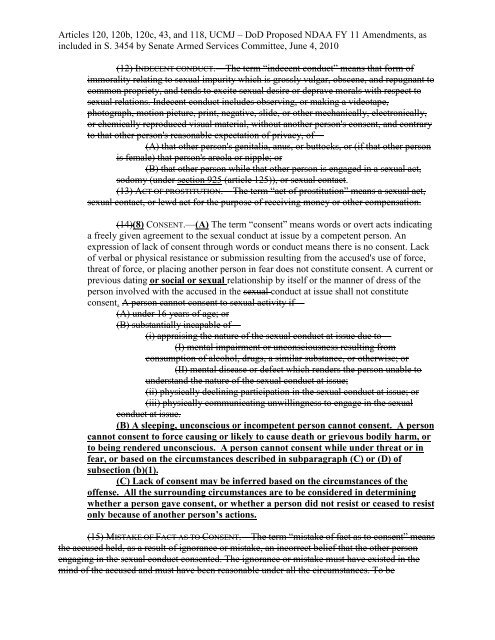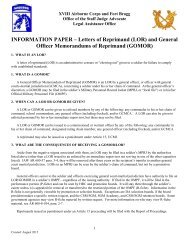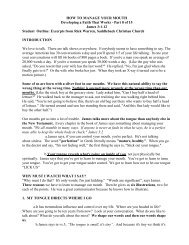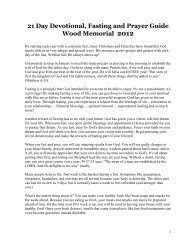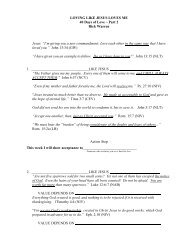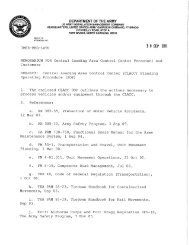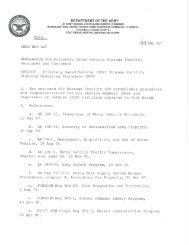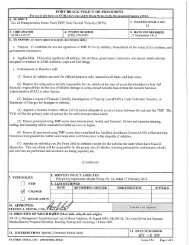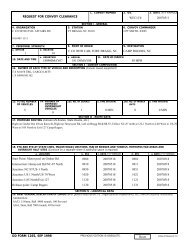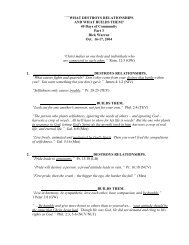Articles 120, 120b, 120c, 43, and 118, UCMJ – DoD Proposed ...
Articles 120, 120b, 120c, 43, and 118, UCMJ – DoD Proposed ...
Articles 120, 120b, 120c, 43, and 118, UCMJ – DoD Proposed ...
You also want an ePaper? Increase the reach of your titles
YUMPU automatically turns print PDFs into web optimized ePapers that Google loves.
<strong>Articles</strong> <strong>120</strong>, <strong>120</strong>b, <strong>120</strong>c, <strong>43</strong>, <strong>and</strong> <strong>118</strong>, <strong>UCMJ</strong> <strong>–</strong> <strong>DoD</strong> <strong>Proposed</strong> NDAA FY 11 Amendments, as<br />
included in S. 3454 by Senate Armed Services Committee, June 4, 2010<br />
(12) INDECENT CONDUCT.—The term ―indecent conduct‖ means that form of<br />
immorality relating to sexual impurity which is grossly vulgar, obscene, <strong>and</strong> repugnant to<br />
common propriety, <strong>and</strong> tends to excite sexual desire or deprave morals with respect to<br />
sexual relations. Indecent conduct includes observing, or making a videotape,<br />
photograph, motion picture, print, negative, slide, or other mechanically, electronically,<br />
or chemically reproduced visual material, without another person's consent, <strong>and</strong> contrary<br />
to that other person's reasonable expectation of privacy, of—<br />
(A) that other person's genitalia, anus, or buttocks, or (if that other person<br />
is female) that person's areola or nipple; or<br />
(B) that other person while that other person is engaged in a sexual act,<br />
sodomy (under section 925 (article 125)), or sexual contact.<br />
(13) ACT OF PROSTITUTION.—The term ―act of prostitution‖ means a sexual act,<br />
sexual contact, or lewd act for the purpose of receiving money or other compensation.<br />
(14)(8) CONSENT.—(A) The term ―consent‖ means words or overt acts indicating<br />
a freely given agreement to the sexual conduct at issue by a competent person. An<br />
expression of lack of consent through words or conduct means there is no consent. Lack<br />
of verbal or physical resistance or submission resulting from the accused's use of force,<br />
threat of force, or placing another person in fear does not constitute consent. A current or<br />
previous dating or social or sexual relationship by itself or the manner of dress of the<br />
person involved with the accused in the sexual conduct at issue shall not constitute<br />
consent. A person cannot consent to sexual activity if—<br />
(A) under 16 years of age; or<br />
(B) substantially incapable of—<br />
(i) appraising the nature of the sexual conduct at issue due to—<br />
(I) mental impairment or unconsciousness resulting from<br />
consumption of alcohol, drugs, a similar substance, or otherwise; or<br />
(II) mental disease or defect which renders the person unable to<br />
underst<strong>and</strong> the nature of the sexual conduct at issue;<br />
(ii) physically declining participation in the sexual conduct at issue; or<br />
(iii) physically communicating unwillingness to engage in the sexual<br />
conduct at issue.<br />
(B) A sleeping, unconscious or incompetent person cannot consent. A person<br />
cannot consent to force causing or likely to cause death or grievous bodily harm, or<br />
to being rendered unconscious. A person cannot consent while under threat or in<br />
fear, or based on the circumstances described in subparagraph (C) or (D) of<br />
subsection (b)(1).<br />
(C) Lack of consent may be inferred based on the circumstances of the<br />
offense. All the surrounding circumstances are to be considered in determining<br />
whether a person gave consent, or whether a person did not resist or ceased to resist<br />
only because of another person’s actions.<br />
(15) MISTAKE OF FACT AS TO CONSENT.—The term ―mistake of fact as to consent‖ means<br />
the accused held, as a result of ignorance or mistake, an incorrect belief that the other person<br />
engaging in the sexual conduct consented. The ignorance or mistake must have existed in the<br />
mind of the accused <strong>and</strong> must have been reasonable under all the circumstances. To be


